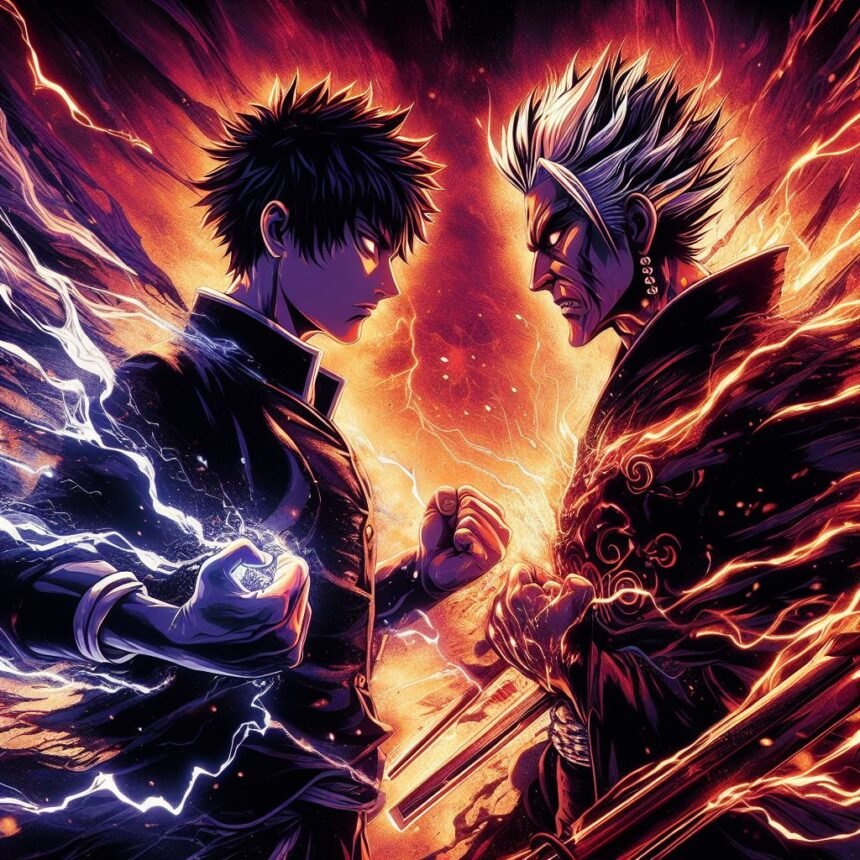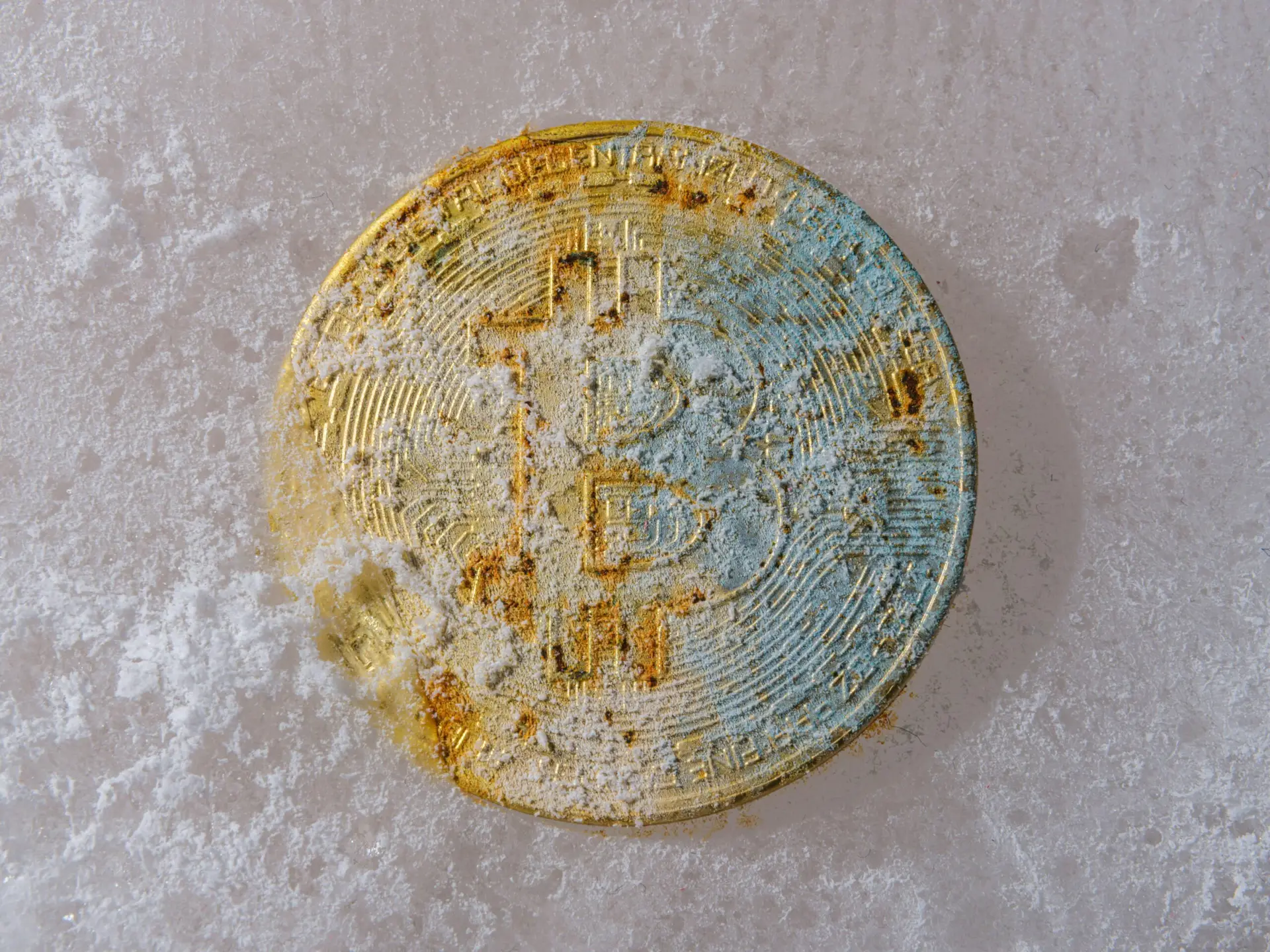Gojo’s death in his fight against Sukuna has left everyone in shock, and it raises some questions. Why did Gojo feel empathy and love for the person who killed him? After all, Sukuna is a ruthless man who has wiped out entire clans and even violated his own foster son. How does this make any sense? Well, let’s dig deep into the true meaning of strength and why the author, Gege Akutami, chose to let Gojo die.
The Battle of the Strongest:

Their epic battle took place on December 24th, which marked Gojo’s death anniversary, shared with his best friend, Geto. The narrative sets them up as enlightened beings, representing the concept of an immovable object facing an unstoppable force. Gojo is so powerful that even Gege admitted it was challenging to write the story with him around. So the idea of sealing him away was created to keep the story balanced.
In every chapter of Gojo versus Sukuna, we see old sorcerers witnessing their strength and acknowledging that it’s impossible for anyone except the strongest. This idea is linked back to Suguru Geto’s statement in chapter 78. Gojo claimed that Geto’s idea of killing all the sorcerers was impossible, but Geto questioned Gojo’s arrogance. He asked, “Are you the strongest because you are Satoru Gojo, or are you Satoru Gojo because you’re the strongest?” This philosophy defines Gojo’s character.
In the end, Gojo drew a line between himself and Geto, his best friend who once shared the title of the strongest with him. This same line is later drawn between Gojo and Sukuna in Chapter 236. Because they are both the strongest, Gojo can empathize with Sukuna’s solitude more than anyone else.
Gojo says, “I love everyone and don’t feel lonely now, but along the way, there was a line I drew, not as a human, but as a living creature.” He likens it to a barrier between him and the world, even his own students. This same line is seen between Sukuna and society.
Both Gojo and Sukuna were threatened by assassins from rival clans. Sukuna had to deal with the Fujiwara forces, whom he killed instantly, while Gojo had to face cursed users who wanted his bounty. This common experience created a line between them and the world. Just like Gojo, Sukuna also suffered the consequences of being the strongest. In Chapter 96, cursed users lament that Gojo had taken away their freedom.
The story suggests that if someone tries to take their freedom, they won’t hesitate to retaliate. The comparison between Gojo and Sukuna continues as both of them believe sorcery is a selfish sport. Each character in the story has developed based on this philosophy. For example, Megumi developed his domain expansion by following Gojo and Sukuna’s words to manifest his will.
Yuta, another character, starts fighting for himself for the first time, rather than just protecting his loved ones. This allowed him to exceed his capabilities and win his fight. However, like Yuji’s comment to Yuta, there is always a limit to trying to embody this selfish nature of jujutsu. But not for sorcerers like Sukuna, who can disregard all else, just like a natural calamity.
Gojo’s Limitless is ironic, as it created a barrier between himself and the world from the moment of his birth, disrupting the balance of the world. Gojo was connected by fate to Tengen and the responsibility that comes with being the strongest. He lived in a bubble, always told about his title since childhood. This perception created the idea that things only have value when measured by strength.
The Burden of Strength:
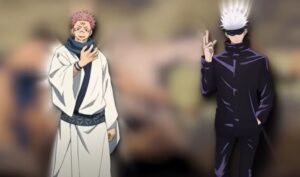
Even his own existence and the purpose of his power only became clear after Geto’s betrayal. Geto was the moral compass between the two, and Gojo had an ego. He used sorcery for himself rather than protecting others. When Geto labelled him just like the others in the world, Gojo lost the last human connection. No one could truly relate to him, and the bubble just got bigger.
Even Shoko, his childhood friend, called Gojo an idiot for always acting like he was all alone when, in reality, she was right there beside him. But since she didn’t have a strong curse technique, Gojo didn’t let his bubble burst. He claimed to foster a strong group of students and believed that Yuta and the others could reach his level of strength. However, Kaku quickly dismissed this idea when Gojo was sealed, reaffirming Gojo’s loneliness.
Gojo’s self-actualization of who he is flawed, as he self-imposed barriers onto himself and wasn’t truly free, unlike Sukuna, who isn’t affected by this idea of loneliness, considering it greedy. In Chapter 237, Sukuna doesn’t even identify with human morality or psychology. He operates on a different plane of existence.
Upon Gojo’s death, he comes to terms with the errors of his ways and the shortcomings of his ideal self. Gojo felt bad for both sides and didn’t find the satisfaction he had expected. All he truly wanted was for his best friend to be by his side forever. During the airport scene, he opened up to Geto about his feelings, expressing his desire to be with his loved ones and feel normal again.
Love, Loneliness, and the Search for Fulfillment:
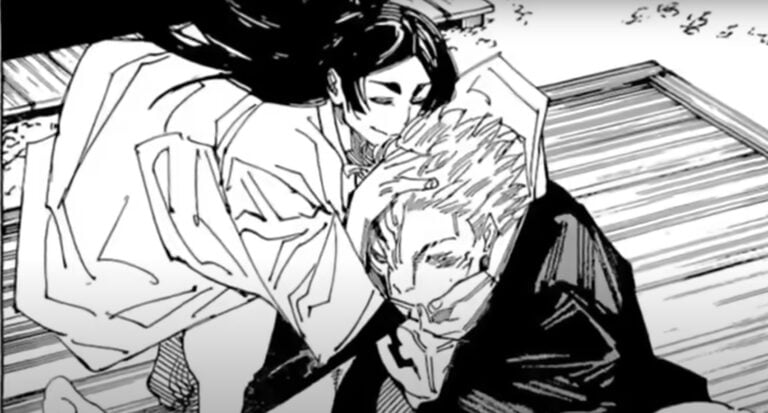
Now, you might be wondering why the story keeps focusing on loneliness and what it has to do with love. The idea of loneliness is highlighted by Sukuna. Yoruzu and an ancient sorcerer fell in love with Sukuna, projecting the same idea of loneliness onto him, just like Gojo did.
She was a master and could do as she pleased with her selfish nature. Due to this, she never had the opportunity to develop any meaningful relationships, as everyone would fear or label her for committing acts of savagery. Yet, she received an appointment here in the capital. That explains it all. However, after seeing Sukuna and realizing his beauty, she believed she could understand Sukuna, as they shared the same problem.
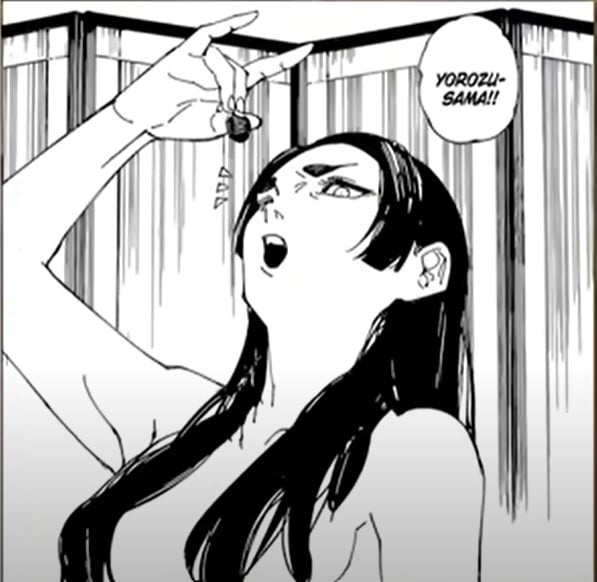
This caused Yoruzu to have a new goal, much like Gojo, where she wanted to remedy Sukuna‘s loneliness with the idea of love. To achieve this, Sukuna needs to exert every inch of his power and feel satisfied. Remember, in the afterlife, Hiara and Anomy mentioned that Gojo lives for jujitsu and is perverted with his use of sorcery, as it stems from his selfish need to “bust nuts” with his opponent.
Everyone’s comment of how Gojo lives for jujitsu and does not wield it to protect others brings the story full circle from his fight against Toji, where Gojo claimed he was no longer fighting for others, rather himself and the requirement to become the strongest. This allowed him to evolve and become the honored one, referring to Buddha himself, using his quote about heaven and earth.
Therefore, both Gojo and Sukuna’s selfish nature with jujitsu made them beings that evolved to godhood. Hence, Gojo even accepts Kaku’s terms to wait until December 24th, rather than just killing Sukuna at 15 fingers with an incomplete body. Thus, Kinjaku said Gojo is best when he is alone, and all his friends claim he should just complete all missions on his own. He purposely took a gamble and a hard decision because he wanted to satisfy himself, letting Sukuna get to his full power.
This leads to your next question: Why did Gojo think about Sukuna’s feelings and be disappointed instead of focusing on saving the world and his friends? Well, Gojo wanted to fight Sukuna with his entire experience. It’s like two lovers trying to please each other, but only one leaves satisfied. Gojo cannot receive love by conventional means due to their positions.
Even Shaker highlighted that she could never have fallen in love with Gojo, even if hell froze over. So, in parallel with Yoru’s revival in the current games, she tries to show Sukuna that there are people as strong as him, that his solitude belongs to himself, and that they can get married. However, since Sukuna is above everyone and understands true jujutsu, his domain expansion, introduced so early in the story, establishes his divinity. He’s like an artist creating an impossible masterpiece on thin air.
That’s why in Chapter 225, Kosimo refers to Sukuna as a god. Later, in Chapter 238, he uses his x-ray vision to see Sukuna’s original body as perfection. Kosimo is mesmerized, calling the king of curses the man who spreads the ultimate misery in the world, the definition of beauty.
This is because Sukuna has evolved to be the perfect killing machine. He can make hand seals while two of his other hands are free to fight or defend, or even use his cursed tools. Sukuna even has multiple mouths to help him chant his incantation without any breaks. This evolution allowed him to destroy everyone in the Heian era, every single elite sorcerer family, even when facing 20 of them at once, only for them to lose.
In fact, the gap between Sukuna and everyone else is so wide that the story, every theme, every cornerstone of each character, is just catching up to him and his strength. As a result, Yoru can’t be compared to him to satisfy his needs. Sukuna instantly deduces her technique as the perfect sphere, claiming it’s boring. Curse techniques like hers, which are energy-based, always end up the same. Therefore, he’s already adapted to it and has so much experience in jujutsu that no one can quench his thirst.
This isn’t even the first time Sukuna has stated this. As Nanako and Mimo’s mobile technique is also instantly deciphered by him. He proceeds to call it boring. Similarly, Gojo couldn’t even have hobbies, because whatever he did would be mastered rapidly, leading to boredom. Once again, as a result of this superiority over everyone else in existence, Sukuna is assumed to feel isolated at the top.
But the truth is, his solitude led him to relentless aggression, like a calamity. This links to Yoru’s question of why Sukuna spread so much misery. In response, he tells Itadori that flies and insects should just die in misery rather than clinging onto life. Why do they continue to be weak when life itself is suffering and pain, much like the Buddhist philosophy of the cycle of samsara? In Buddhism, desire and ignorance lie at the root of suffering, and this misery fuels curse energy and Sukuna’s dominance over the world.
That is why Gege used A’s character to literally personify this metaphor, as her technique made her an insect. Sukuna distinguishes a clear line where morality becomes fragile and meaningless to those on top. These people shed all likeness to others. Though on the surface, Gojo might seem different, in reality, he isn’t. Even as a teenager, Gojo called cursed users who tried to kill him small fry, just like Sukuna would. This sentiment is highlighted again by Gege in Chapter 237 with Kimo, who is a character foil to both of them. He too had the title of the strongest in his era 400 years ago.
No one was able to challenge him or even force him to use his one-time curse technique. He was bored and lonely until Kinjaku made him an offer to face Sukuna, as he had never seen someone stronger than him in 600 years. This gave Kimo the same perspective, as he questions Sukuna, “Did you become the strongest, or were you born as the strongest?” He wanted to know if Sukuna even interacted with others without knowing weakness.
Kashima asks if it’s even possible to feel love for other people. As he himself was too strong, to the point where every other human was nothing more than fragile dust in front of his existence. And since cursed techniques reflect your reality, Kimo’s technique disintegrates everything around him into that very thing he believes. Hence, he requests Sukuna to teach him if the curse of being the strongest is to wander endlessly in the path of loneliness.
In response to this, Sukuna calls them greedy because Gojo and Kimo want to be the strongest but also have human emotions that fulfill their loneliness. And then they expect him, of all people, to teach them. The expectation and self-projection of loneliness have been imposed on Sukuna. They all assume Sukuna must have felt this same existential problem.
However, Sukuna is absolutely free from any chains. Sukuna didn’t need anything from anyone. And though Gojo called him the challenger, the reality couldn’t have been more different. As Sukuna answers Kashima’s question, explaining the love that they seek is absolutely worthless. In reality, Gojo and Kimo, who were yearning for it, didn’t truly understand the true meaning of love like him.
To Sukuna, he interacts with others and shows his love by killing those who challenge him, as he fulfills their purpose of giving them a true fight. Among the countless elite sorcerers in his lifetime, not one has cursed him. And that’s because, like Gojo, their needs have been satisfied. If that isn’t affection and kindness, then what is? This is the love and affection displayed by the powerful. Kimo then questions if Sukuna is really satisfied with this type of transaction.
Even cursed spirits like Jogo, Sukuna stated, “Stand proud, you’re strong.” As in the end, he is always the one who is fulfilling the love of those who seek to test their strength, rather than being fulfilled himself. Gojo and Kimo being an example. In response, Sukuna explains that because he understands what love is, he can reject it at any time, as he deems it to be worthless.
This is why he never once thought of being fulfilled by another person, as he can easily fulfill himself. The actions he does are the very reflection of this. He can eat what he wants, kill who he wants, and play with whom he wants. Sukuna lives free and alone from all attachments, and if others can’t deal with that, then that’s their problem.
In fact, his dialogue with Jogo tells us a lot about this, as Sukuna expresses the importance of taking hold of one’s desire, disregarding everything else entirely, with the idea of the need to flock together and to have a defined identity. That is a weakness that stunts their growth. In the end, Sukuna and Gojo are meant to portray two sides of the same coin. However, Sukuna is the embodiment of what one could call individualism and extreme selfishness, which favors the freedom of action and growth of the individual over that of the group.
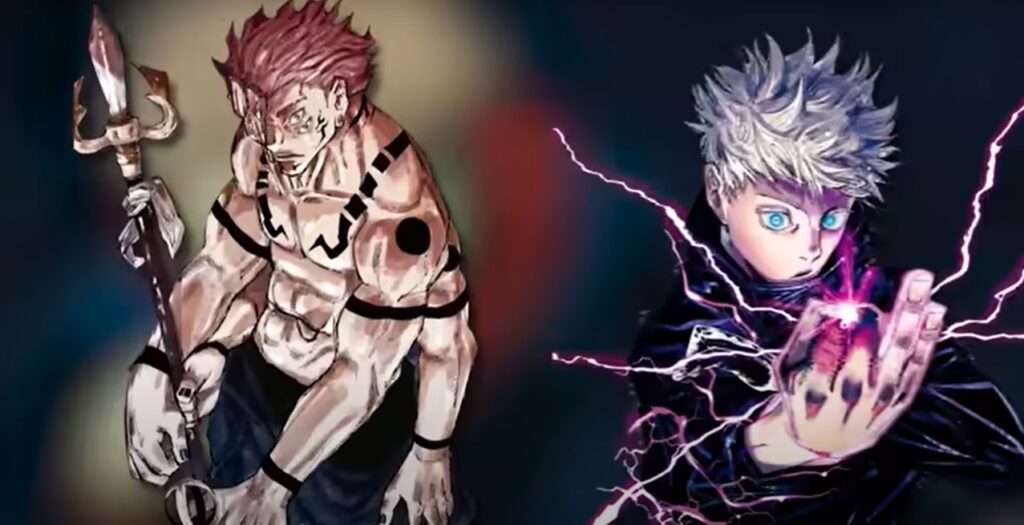
For example, in Chapter 199, Angel abides by God’s law and stated her sole purpose is to destroy Sukuna. But even she chose to be symbiotic with Hana Kurusu rather than taking over her body and soul, even though it would have been beneficial to her and would have avoided the mistake Hana ultimately made against Sukuna in Chapter 22. Sukuna would call Angel an idiot for making such a mistake by holding on to ideals.
Therefore, in contrast to everyone else, Sukuna is the personification of selfishness that comes at the cost of everyone around him.


